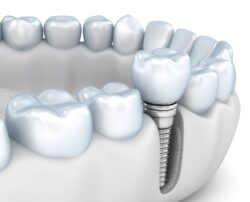Missing teeth can severely disrupt your life. You might struggle with your usual oral functions like chewing and speaking. And you may feel a blow to your self-esteem when you have gaps interrupting your beautiful smile.
But tooth loss can put you in danger of further oral health complications as well, including damage to the bone in your jaw. Your dentist can help you avoid these potential issues by replacing your missing teeth with dental implants. Read on to learn more about your jaw and how tooth loss and tooth replacement with dental implants can impact its structure.

How Does Tooth Loss Affect the Jaw?
A healthy dental patient has a full set of teeth, and each tooth features a root that extends below the gumline to reach the jaw. The tooth root stimulates the bone in the jaw, keeping it strong and stable.
If you lose a tooth, the jaw no longer has a tooth root to keep it healthy. In the root’s absence, the jawbone will start to deteriorate. You could see any remaining teeth start to shift out of place as a result, and you could also see the appearance of facial sagging.
You cannot stop these effects on your own. Ask your dentist for help in preventing complications from tooth loss with restorative dental solutions.
How Do Dental Implants Preserve Jawbone Health?
A dental implant features a titanium post anchor that a dentist will surgically insert into the jaw. This fuses with the bone there to ultimately support prosthetic teeth after it heals. You can see a long-lasting restoration of the look and function of your smile with this treatment.
But the anchor of the implant will also serve to replace the missing tooth root. Removable options like dentures will only replace teeth above the gumline. The anchor stimulates the jawbone once again, preventing it from deteriorating.
You can preserve the structure of your face and teeth this way. The implant can endure for twenty years or longer, offering protection as well as an enhancement for your smile.
Can My Jaw Sustain a Dental Implant?
Though the benefits of implant dentistry seem clear, not all patients can qualify for this dental treatment. Implants rely on the fusion of the anchor with the jawbone. So you must retain enough healthy jawbone for this process to occur properly.
If too much bone in the jaw has deteriorated due to tooth loss, your mouth cannot support the implant fixture. A dentist will evaluate your jawbone health prior to starting dental implant treatment to ensure you are a good candidate for the procedure. They use x-ray imaging to see any damage to your jaw.
If you do not have enough bone in your jaw for implant dentistry, a dentist might suggest alternative restorative solutions to replace missing teeth. They might also refer you to a specialist for a bone graft which can add stability to your jaw. You may then be able to sustain an implant after recovering from this surgery. Call your dentist for a consultation to learn more.
